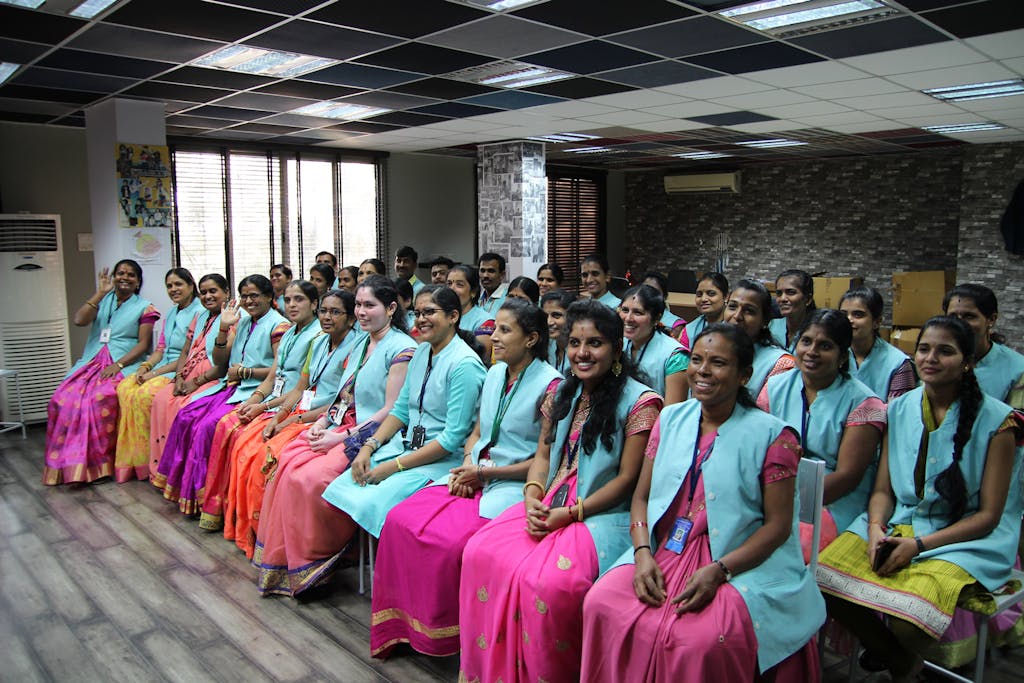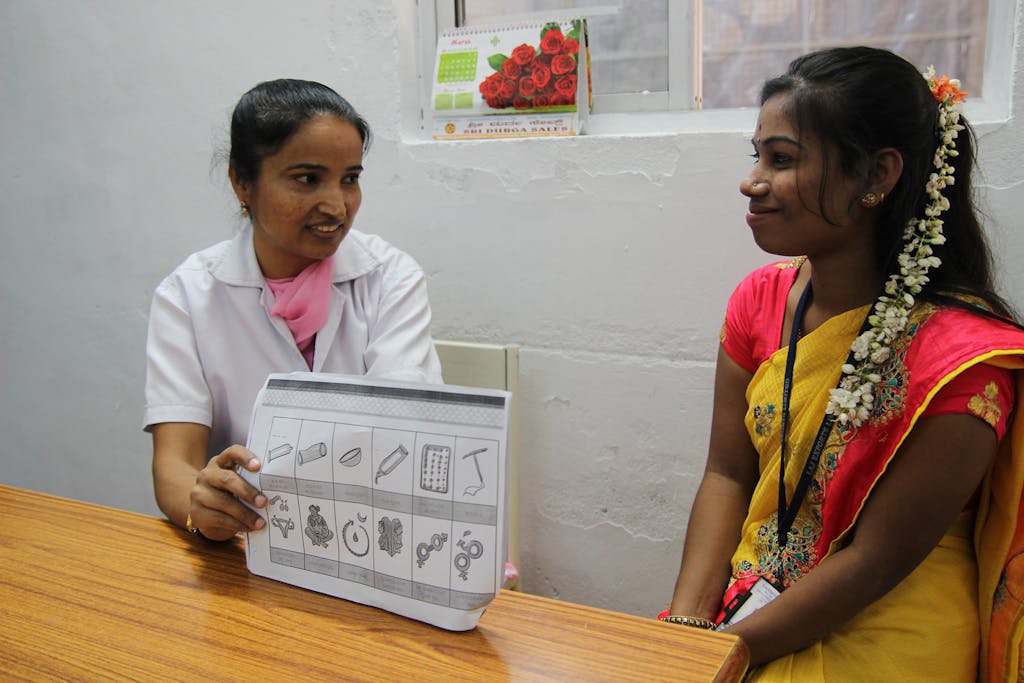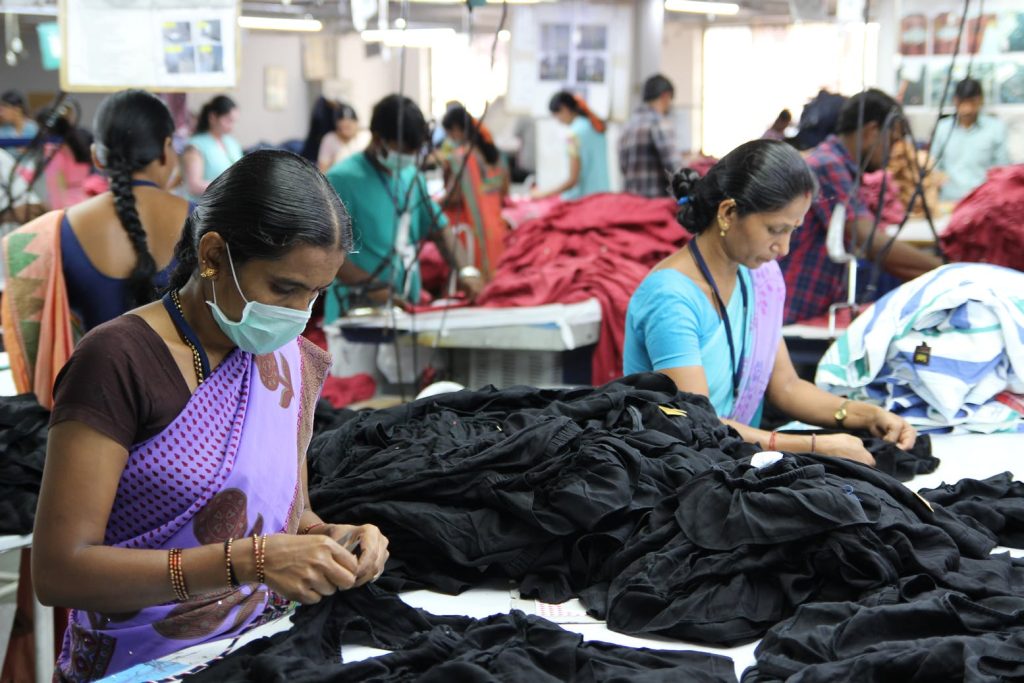On a recent trip to Bangalore, India, I visited a garment manufacturer called Laj Exports that supplies fabric to brands like Lee, Wrangler, and Guess. Roughly 70% of the factory’s workers are women, each of whom stitch, sew, cut, and package clothing items that are exported globally — some of them landing right in my own closet.
This is typical of the apparel sector in India, which employs 8 million people, more than half of whom are women.
Yet, despite these economic opportunities, women in India face numerous challenges to their health and well-being that both reflect and perpetuate the country’s long standing gender inequality — from lack of quality contraception and maternal care, to malnutrition and domestic and gender-based violence. In the workplace, health challenges like these often manifest as higher turnover, reduced productivity, and absenteeism.
Factories like Laj Exports have a unique opportunity to help bridge this gap by providing critical health information and services for their female workers, thus fulfilling basic human rights while driving business returns.
In 2018, Laj Exports launched Zalando’s Life Skills for Empowering Women program to do exactly that. The company joined forces with Swasti Health Catalyst, a non-profit organization in India with expertise creating and implementing worker health and well-being programs, to offer women at Laj Exports information on topics ranging from hygiene, sanitation, reproductive health, and nutrition to financial planning and resources to address gender-based violence and discrimination.
What’s more, the hands-on program is run by the employees themselves. At the start of the program, approximately 35 women workers were selected by factory management to be peer educators who underwent intensive training on these topics in order to disseminate the information to fellow employees and answer questions. The peer educators are recognized by their bright blue vests, making it easy for other factory workers to identify them in times of need.

Wellness facilitators in their blue vests gather for a group photo
In addition to providing its employees with health care information, the factory has an on-site clinic staffed by a nurse named Gopi, who was trained through Swasti to provide health information and services such as menstrual cramp medication, sanitary napkins, and family planning counseling, including talking through contraception options like an IUD or condoms. When I met Gopi in December – proudly standing in her crisp-white uniform inside her clinic – she had already had 15 visitors that week.
“Many women tell me how happy they are that we provide contraception. They say you don’t get this in most other factories,” said Gopi with a smile. She also meets with the wellness peer educators during their trainings to help educate them about the services available in the clinic and answer medical questions. “More women come to the clinic now after these trainings. They are aware and want my help,” she added.
Since the rollout of the wellness program and clinic, Laj Exports has seen a reduction in its employee turnover rate. While most other factories in India have a rate of 8-10%, Laj Exports only has a 5% turnover rate. General Manager of Human Resources and Compliance G.S Patil says that employee morale and factory output has increased, with the factory producing more garments than ever before. Because of this success, management plans to further build out the program: In addition to providing training on anemia, hypertension and diabetes, they will be providing reproductive health services such as cervical cancer screenings, family planning, and menstrual hygiene products in the next few months, with more robust reproductive health information training for peer educators.
“Employees’ health is our wealth…if the employees are not there, we cannot run the factory,” G.S Patil explained. “Employees are part of our family. We take care of everything for them — what they want, whatever grievance they have, that’s the main thing.”
The wellness trainings and on-site clinic at Laj Exports are ideal examples of how some businesses are setting new, people-centric standards of running their operations where good health and well-being doesn’t just benefit the workers, but the factory as a whole. Apparel companies around the world are increasingly investing in essential health and well-being programs for their workers, particularly for female workers in their global supply chains. The goal is, first and foremost, to improve the health and well-being of women workers around the world. Yet these programs also have the power to enhance worker productivity and reduce turnover — a win-win for women and for businesses alike — while adapting to growing consumer demand for ethically made and sourced products.
Through the United Nations Foundation’s Private Sector Action on Women’s Health and Empowerment Initiative, my team works with leading apparel and agriculture companies that employ millions of women in their global supply chains to make the case for investing in employee health and well-being. We then connect these companies with the right organizations to develop plans to realize and reap the business benefits of this investment.

Gopi teaches a factory worker about contraception methods in her clinic using Swasti materials
By establishing a robust worker health and well-being program, Laj Exports has joined the ranks of apparel brands such as Nordstrom, Columbia Sportswear, and Inditex in investing in the health, well-being, and empowerment of their female employees. This emphasis on worker health and rights also shows how the private sector is feeding into progress on the Sustainable Development Goals (SDGs), in particular SDG 3 on health and well-being and SDG 5 on gender equality. With just 10 years to go until 2030 — the agreed upon deadline to achieve the SDGs — now is the time to connect the dots between women’s shift into the global workforce, their unmet need for essential health and empowerment information and services, and the business potential of a healthy and productive workforce.
Companies with global supply chains have an unprecedented opportunity to meet the critical health and well-being needs of women right where they are — in the workplace — and consumers have a critical role to play in wielding their buying power for a healthier, more sustainable future. So the next time you’re browsing online or shopping at a department store, I hope you’ll join me in thinking about where your clothes come from — and the women behind them.
The United Nations Foundation, together with the Bill & Melinda Gates Foundation, the UK’s Department for International Development, and Merck for Mothers*, is leading the Private Sector Action for Women’s Health and Empowerment Initiative to work with companies that have large global supply chains employing millions of women workers to improve the health and well-being of their workers. To learn more about company commitments and explore the business case for investing in workplace women’s health and empowerment, visit www.privatesectoractionforwomenshealth.com

